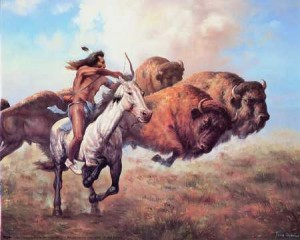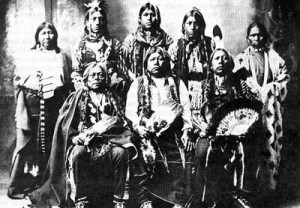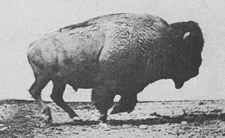What can the Tonkawa-the Original Austinites-teach us about sustainability?
News of the second oil spill gushing towards Lake Michigan has really ruffled my feathers. I don’t understand why the dichotomy between the natural and modern world can’t fuse to work as one organism. After all, the modern world exists within the natural.
No people lived in harmony with nature better than Original Austinites. How have sustainable living practices over the past 600 years changed? What did our predecessors do better, and how can we improve?
They All Stay Together: 600 years ago, Austin was Tonkawan territory. The word Tonkawa translates to “They All Stay Together”, which they did in almost every aspect of their culture. They raised their children, cooked, hunted, ate, made tools, made clothes and homes-all as a village. Every person in their community had a purpose, and was cared for. Educational methods revolved around the idea that everything is connected. A lesson that many of us never learned in the city.
Food and Shelter:
- The Original- Huntin’, and gatherin’, and cookin’… Tonkawas were pretty much the sexiest people ever. They thought they were the ancestors of wolves? Yeah, just like Jacob. Their men were hunky, skillful hunters of game. Their women were interesting and resourceful people that knew their surrounding ecosystems so well that they didn’t need to farm. They gathered plants such as acorns, honey mesquite, prickly pear, etc. They used animal and plant scraps to make their clothes, weapons, tools and homes. Tipi making skills were a given.
 The Modern- Shoppin’, and microwavin’, and eating out... While the modern homosapien claims champion cart pushing skills in grocery stores, we are generally lacking in the hunting and gathering department.
The Modern- Shoppin’, and microwavin’, and eating out... While the modern homosapien claims champion cart pushing skills in grocery stores, we are generally lacking in the hunting and gathering department.- Opportunity- Don’t get me wrong, I’m not about to enroll in tipi making classes. However, it should be noted that Tonkawas didn’t overhunt or overgather. As a society, we should understand the connection between eating too many burgers and land degradation. The void of connectedness with nature robs us of an ability to understand such simple notions.
Survival:

- The Original- Killin’, and scalpin’, and prayin’ … Tonkawas were famous warriors. Natives used self-made tools such as arrows and spears to fight off their enemies. Most knew what herbs would treat their illnesses, and consulted Shamans for more advanced problems. They fended for themselves in concord with what nature sanctioned. They were generally very fit survivalists-until the Europeans came to town.
- The Modern- Exercisin’, and eatin’ well, and pilates, and condoms…Our technology, has without a doubt, allowed us to evolve past a primitive state… (eh, unless you count climate change, but we’re not even gonna go there). So besides that, we rock. Right?
- Opportunity- We need to claim our environment as an heirloom to be inherited and eventually bequeathed to our decedents. Is the way I live healthy or harmful for my personal environment? Is what I’m consuming healthy or harmful? Is sitting at my computer and not getting any sunlight healthy or harmful?
Am I saying that we should parade around in loin cloths? Of course not. I’m simply saying there’s a better way to live. Austin’s got it down better than the next town. I think the key here is to learn to develop a true sense of community as the Tonkawas did. The distraction of virtual relationships and online social webs deter us from developing real relationships with our neighbors and fostering necessary interdependent connections. If we can establish community, we can better understand our place in this network of ecosystems.
Let’s learn to be respectful, resourceful and purposeful. We also should understand that our survival depends upon maintaining a balance of nature. Sometimes we’ve gotta look to our past to begin planning a future.
What are some lessons you can learn from the Tonkawa?
If a Tonkawan Chief became mayor of Austin, what do you think would be changed?
Who do you think is the most happy: Modern Austinites or the Tonkawans?
.
Find something Austin-related that you want to share? Photos, screen shots, articles, news? Email us at[email protected].
Want more RoA? Be our friend on Facebook. Add our RSS feed! [what’s that?]. Start your morning with Republic of Austin in your InBox. Or read us 24-7 on Twitter!
Related posts:
- 3 Life Lessons I Learned In 2009 About Friendship And The Art of Silence Ari looks back at 2009 and discovers what she's learned...
- Do Austinites live off of hopes, dreams and angel farts? After attending a stimulating meeting at CIty Hall, Ari starts...
Related posts brought to you by Yet Another Related Posts Plugin.







But a nomadic lifestyle is no longer feasible. We need to do things like get rid of the McMansion ordinance so we can build dense urban infill and stop spreading out and instead start filling in.
A ranch in the country with your own farm sounds nice, but it’s really just sprawl with a greenish tinge.
Yes! It’s all about doing what’s best for the way we live now. Definitely wasn’t suggesting we all go buy a ranch. Thanks for reading Tim.
Love this topic!
I think the big question I always have with relating Native Americans to today is….What would the Tonkawa be like if they just came into existence today? What would differentiate them?
Native Americans teach us a lot about survival basics, but they were really just using whatever resources were available to them, and those resources progressed with technology, just as ours have. For instance, they progressed from axes to arrows to rifles, just like us.
So whether or not they’d be using a GPS to get around and talking to someone on their iPhone, I think is a harder question to answer than one might expect.
The big thing we can learn from Native American culture is the harm of wastefulness.
Michael Pollan discusses that merger of Indigenous people to modern civilization in his book “In Defense of Food”. He touches on a case study in Australia. In modern day Australia, scientists went out and took a group of Aboriginese men from their natural habitats and placed them jobs in the city. Within a year the men had adopted a modern lifestyle… and also adopted our diseases. They had diabetes, heart disease and at best high cholesterol. I bet they used GPS too. How else is an Indian supposed to get around in a modern city!? Our surroundings definitely shape the way we live.